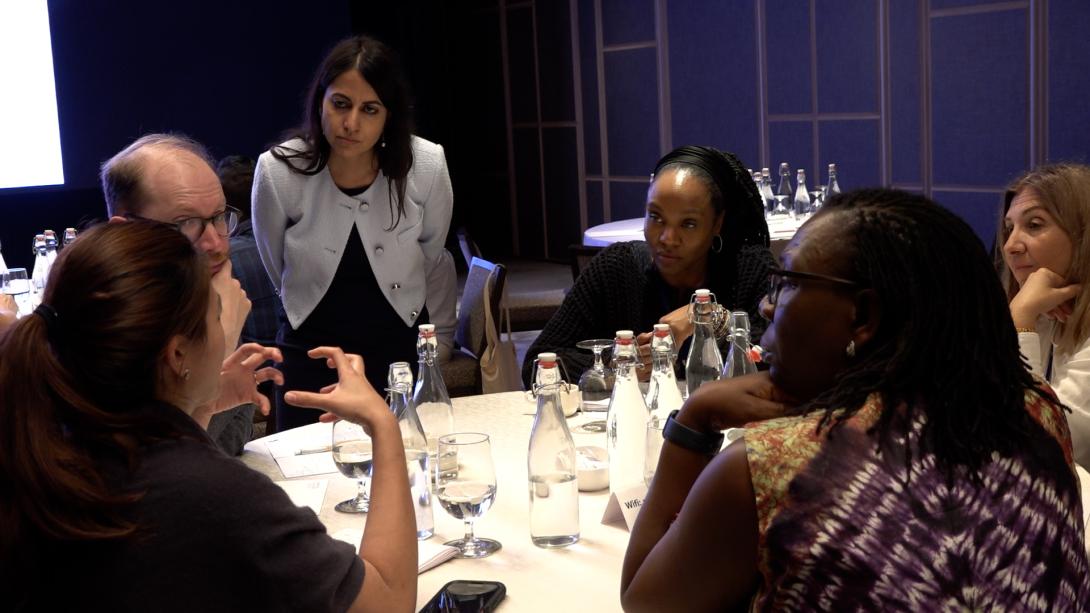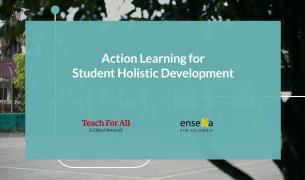What kind of leadership will it take to transform education?

We are living through a convergence of global crises. Nearly half the world’s population is under 30, yet many young people are growing up amidst deep uncertainty:
- 244 million children and youth are out of school
- 1 in 7 adolescents experiences a mental health disorder
- Over 100 million young people are growing up amid instability or armed conflict
- Climate disasters are now displacing more young people than conflict
The systems meant to prepare young people to shape and lead the future—especially education—are not keeping pace with the world’s realities. Designed for another era, our education systems are too often outdated, inequitable, and disconnected from the challenges young people face.
Yet there is hope. Around the world, bold and imaginative leaders are showing what’s possible. These leaders—from students to policymakers—remind us that leadership isn’t defined by position, but by the courage to ask deeper questions. If we’re serious about shaping a different future, we must ask: What is the purpose of education? And what kind of leadership do we need to meet this moment?
At the Global Forum for Shaping a Better Future earlier this year, students, educators, and other system leaders from across the globe came together to take on these questions. Five key building blocks of the leadership we need to transform education—and to build a more just, compassionate, and sustainable world—emerged:
1. Challenge Outdated Paradigms
Education still clings to a paradigm shaped by the Industrial Age: narrowly focused on knowledge and skills, designed to produce efficient workers. In a world evolving faster than ever, that approach is no longer enough.
The philanthropist and changemaker Lam Nguyen-Phuong describes the “triple divide” that defines our era: disconnection from ourselves, from one another, and from the planet. Responding to these challenges demands that we educate young people, and grow their leadership, in a radically different way than in the past. “Education is just a mirror of society, and it’s clear it’s not working,” Lam says.
It’s time for leaders who aren’t just tweaking broken systems, but who are bold enough to reimagine them. There is a growing call to redefine the purpose of education—not only as a pathway to academic achievement, but also as a way to grow whole human beings who embody: a deep awareness of themselves and the world; a felt sense of interconnectedness; the agency to take on the challenges they’ve inherited; and the wellbeing and belonging to thrive in uncertain times.
2. Lead Systemically and Embrace Collective Intelligence
Today’s challenges—conflict, inequity, environmental collapse—aren’t just complex, they’re deeply interwoven. We can’t address one without touching another. And we can’t transform education in fragments, because education itself is not separate from these broader societal crises; it’s shaped by them, and often reproduces them.
We need to see our work as systemic, and we need the collective leadership of many diverse leaders tackling the challenge from different angles, across the whole system. This requires growing our relational capacities.
Despite our best intentions, human relationships are often fraught—conflicts escalate into wars, and we harm each other. Our connection to the Earth mirrors this: we dump plastic into oceans, cut down forests, and urbanize spaces that once gave us clean air. The common denominator in all this is humans themselves, says Faith Abiodun, Executive Director, United World Colleges (UWC) International: “We must invest in humans and ensure that a different kind of human emerges.”
Faith calls for leadership that is deliberately inclusive, bringing people together across lines of difference, and building systems that equip young people to see interdependence and act collectively. Many of UWC’s 85,000+ alumni have gone on to lead in government, civil society, and across sectors, not because they are taught the “right answers,” but because their education developed their ability to hold complexity, navigate difference, and think systemically. That’s the kind of capacity we need to grow in more young people, those who will inherit these increasingly “wicked” intertwined challenges.
But as Xavier Prats Monné, former Director-General for Education and Culture at the European Commission, reminds us, thinking systemically isn’t enough. Systemic change isn’t possible without engaging across siloes, and that’s often where things break down. Collaboration gets tripped up by the small things: the words we use, the assumptions we make, the unspoken pressures that remain unnamed. Too often, we lead with our own solutions instead of listening deeply to others’ truths.
Even when we claim to value multiple perspectives, we often don’t slow down long enough to really hear them. If we want to co-create something genuinely new, we must build the muscle to sit with discomfort longer, and listen more fiercely.
3. Elevate Lived Experience and Stay Proximate
Transforming education demands the active participation of many diverse stakeholders, especially those whose wisdom has been excluded by the very systems we seek to change. Angie Murimirwa, CEO of the Campaign for Female Education (CAMFED), challenges us to move beyond celebrating exceptional “success stories” and instead build systems that serve every child. The goal isn’t to applaud the 5% who survive the odds: it’s to dismantle the odds altogether. “How do we go beyond celebration of monuments,” she urges, “and build movements for education for the most marginalized?”
Raised in a rural village in Zimbabwe, Angie herself beat a system stacked against her from birth. That deep knowledge of what’s truly at stake fuels her work, igniting a movement that educates girls from the most marginalized communities. Her organization has activated over 315,000 women across Africa, each personally supporting three more girls to complete their education. This is the multiplier effect in action: investing in those who have experienced injustice unleashes urgency and deeply-rooted wisdom essential to tackling entrenched challenges.
Angie’s example reminds us that leadership is not just about stepping forward, it’s also about lifting others to lead. That means including voices often overlooked: parents who never attended school, community elders, religious leaders wielding real influence in their communities. Transforming education is not a single-sector issue, but a societal one: only a broad, diverse coalition can take it on together.
And for those in power, it means staying proximate—co-creating change with, not for, those most affected.
Kira Orange Jones, CEO of Teach Plus and former elected official, embodies this principle. She combines high-level systemic leadership with deep listening to frontline educators, demonstrating how proximity can fuel resilience and creativity. Amid political division and daily upheaval shaking the education system, Kira found her anchor in a group of 24 dynamic teachers committed to changing US national policy. Working tirelessly with congressional offices nationwide, their firsthand understanding of student realities motivated them to “roll up their sleeves” and stay persistent and generative, rather than falling into polarized extremes.
Proximity is not a gesture, it is a leadership commitment. Without it, lasting, broad change remains out of reach.
4. Treat Students as Equal Partners
Too often, students are excluded from shaping decisions about their own future. Even when they are included, it’s often in tokenistic or performative ways.
The example of Lindsey Huahuamullo, a student leader from Peru and CEO of Wake Up Now—a youth-led organization impacting over 13,000 students across Latin America—shows us why that’s a mistake. Her team of teens leads peer-to-peer programs on emotional wellbeing, critical thinking, and student-designed social innovations—from podcasts to video games that advance the United Nations Sustainable Development Goals and improve local communities.
“Students must be treated as equal partners in the fight for equity and in the fight for a better future of education,” Lindsey says. “We are not just leaders of the future. We are leaders of today.”
True leadership means treating students as real co-creators in redesigning the education systems they live inside every day. It also means listening, not just inviting them to speak. The experience of Indian student leader Sairaj Sagaram and his classmates offers a grim proof point: even after they took the initiative to form a student advisory council and raise urgent concerns about mental health, it took a student’s suicide before adults in the system finally acted. “There was space for us to raise our voices,” Sairaj shares, “but they were not ready to listen.”
Tokenism isn’t partnership. Listening without acting isn’t leadership. If we want education to be relevant and just, we must trust students as full partners in shaping it.
5. Cultivate Love and Compassion with Discipline
Love is not a soft skill. It is a leadership discipline, and perhaps the most urgent one.
Kathleen Chew, a Malaysian lawyer, social entrepreneur, and mother of seven, tells the story of a 24-year-old Irish nun who founded the mission school where Kathleen herself was educated decades ago. This nun had no résumé of accolades or a national policy agenda. But she had vision—and love. She saw each student deeply, valuing not just academic excellence, but also character, kindness, and courage. From that school emerged leaders like Malaysia’s first female Central Bank Governor. But for Kathleen, the nun’s real impact wasn’t about titles, it was how her love shaped generations. “It was child-centered education without the jargon: it was her love for each one and her desire to see each one thrive,” Kathleen says.
Shaheen Mistri, CEO of Teach For India, reminds us that leadership isn’t about grand gestures, but about small acts of love—and that this takes practice to cultivate. “It is small, messy, difficult inner work to be able to respond in the way that you would want, with the value system that you want to lead with, when life throws situations at you,” she shares. One of the most valuable lessons about this came through an ambitious student-led production: a 90-page, Sufi-inspired, Hamilton-style musical. Far more than a performance, it became a vehicle to grow student leadership and bring to life the values of liberty, equality, fraternity, and justice.
In early rehearsals, tensions ran high: kids fighting and screaming, some refusing to sit with peers from different faiths. Shaheen knew their bold vision would only be possible if the love in the room was greater than the task ahead. She led with love, and helped the students do the same. When the 10-year-old lead fell ill on the day of the performance, it was her peers—showering her with love—who lifted her up. Their belief in her gave her strength. And she rose to give the performance of her life.
* * *
We are at a turning point. The challenges we face are deeply ingrained in our social fabric, demanding more than surface-level change. Transformation will take not just new learning, but unlearning—of the mindsets, beliefs, and systems that do not serve our shared future. Education can be a force in this: not just preparing young people to navigate the world as it is, but enabling them to shape the world as it should be.
This moment calls for collective leadership, fiercely generative thinking, and everyday acts of love, so that young people can grow into leaders who will shape a better future for all.
The Shaping a Better Future Blog Series explores the purpose and practices of education and the progress we can collectively make to ensure all students have access to the holistic education they need to shape a better future.


